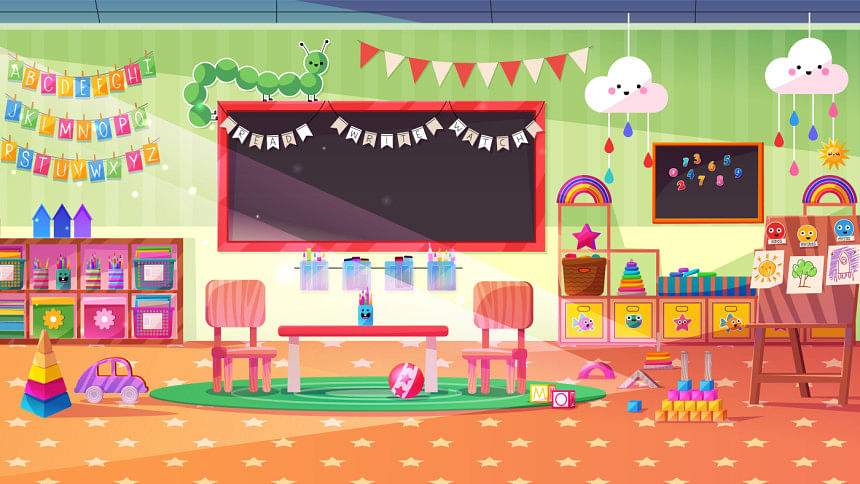Are our preschools truly preparing our youngest?

Just a month ago, while searching for a preschool for a young relative, I had an experience that made me seriously reflect on the current approach to early childhood education in Bangladesh. During a conversation, the school principal remarked that textbooks of the National Curriculum and Textbook Board (NCTB) for pre-primary education contain "nothing to learn," claiming they are mostly filled with pictures and lack academic content. To compensate, the institution had introduced 11 additional books for the pre-Play. My concern was that when we place such heavy cognitive demands on very young children, what space do we leave for meaningful, age-appropriate learning and exploration during the stages that matter most for their growth?
A relative of mine recently shared her concern about her daughter, who is currently enrolled in a nursery class. The child changed schools not long ago, and since then, she has been facing difficulties adjusting. The new school places a strong emphasis on academic content, which is hard for her to cope with. Her teacher has even complained to the mother, saying that the child fails to complete classwork. She often comes home tired and disinterested. In contrast, her previous school focused more on learning through play and interactive activities. That environment made her enthusiastic about school and learning. She used to look forward to going to school every day because it was fun and engaging.
The concept of kindergarten was first introduced by Friedrich Froebel, a German educator. He envisioned kindergarten as a nurturing "children's garden," where young learners could grow and develop holistically. According to Froebel, this environment should encourage self-directed play, exploration of nature, and creative activities, all guided by supportive and understanding teachers. The teacher serves as a facilitator rather than a traditional instructor.
The primary goal of preschool is to prepare children for formal schooling. However, this preparation should not be narrowly interpreted as early exposure to academic content. Instead, preschool plays a crucial role in fostering foundational social and emotional skills that are essential for success in later schooling. According to the National Education Policy 2010, the fundamental aim of pre-primary education is to spark children's interest in learning and motivate them to attend school before formal education begins. At this early stage, children should be encouraged to develop a love for learning, while also having the chance to nurture their social and emotional growth, such as learning to cooperate, work in teams, and follow simple rules, by engaging with their peers.
However, as reflected in the two cases mentioned at the beginning of this article, many preschool and kindergarten institutions still focus heavily on academic content and rely on traditional teaching methods. This practice goes against the core objective of pre-school, which is to prepare children for formal schooling through enjoyable, meaningful, and developmentally appropriate experiences. When children are exposed to academic pressure too early, learning can become a source of fear and disinterest rather than a process driven by curiosity and engagement.
During my academic research on pre-primary education last year, a teacher from a government primary school shared a revealing insight. She noted that when the school strictly adhered to the textbook and instructional guidelines prescribed by the NCTB, many parents expressed dissatisfaction. According to her, the parents often compared government-run pre-primary programmes with nearby kindergartens, which typically follow different approaches and appear to offer more academic content, leading to unrealistic expectations about early learning.
In our society, there is often a common belief that a child who can memorise and reproduce content at an early age is more meritorious. Additionally, there is a widespread notion that learning happens only through books, while play-based activities are merely for entertainment. However, play is not just a form of enjoyment—it is a powerful learning method. Through various types of play and interactive activities, children can connect their experiences to the real world, develop critical thinking, enhance curiosity, and, most importantly, learn social skills, manners, and appropriate behaviour.
While government primary schools in Bangladesh include pre-primary sections for children aged four to five, with trained teachers and supervision, many private kindergartens operate differently. Although they receive initial approval to run, this approval is often based only on administrative requirements. Many private kindergartens, driven by parental demand for accelerated learning, tend to introduce a multitude of academic books and memorisation for very young children. This directly conflicts with the NCTB's focus on joyful, play-based learning and holistic development. To ensure children's well-being and meaningful growth, it is essential to raise awareness among all stakeholders about developmentally appropriate practices in early childhood education. Ensuring consistent pedagogical supervision and ongoing monitoring is also crucial to realising the true purpose of preschool education.
Sayma Chowdhury has an MEd from Dhaka University and specialises in pre-primary and primary education.
Views expressed in this article are the authors' own.
Follow The Daily Star Opinion on Facebook for the latest opinions, commentaries and analyses by experts and professionals. To contribute your article or letter to The Daily Star Opinion, see our guidelines for submission.

 For all latest news, follow The Daily Star's Google News channel.
For all latest news, follow The Daily Star's Google News channel. 






Comments